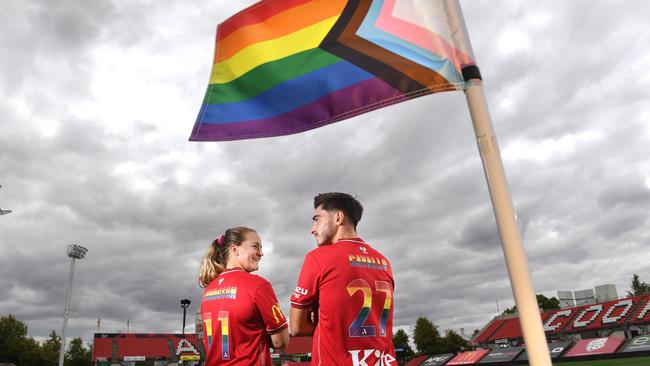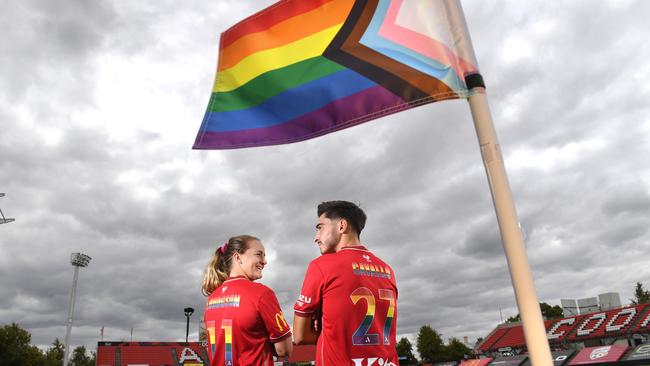Social media abuse in sport, special investigation: How football took on the trolls
A damning survey revealed half of all players in the A-League had copped abuse online. But a social media safety app is helping turn the tide.

Football knew it had a problem with social media abuse of its players, but the extent wasn’t known until a 2020 players’ union survey.
It revealed over 50 per cent of players in the A-League men’s and women’s competitions confronted some kind of abuse online, some of it horrific.
Like the monkey emojis that littered Kusini Yengi’s feed after the then Adelaide United striker scored against Melbourne Victory.
The death wish Newcastle Jets goalkeeper Georgie Worth copped, or the same message the entire Melbourne Victory women’s team received after one game: “I hope your bus crashes on the way back home”.
And, most prominently, the avalanche of homophobic abuse Josh Cavallo received when the Adelaide defender came out in October 2021.

“I knew truly being who I am, that I was going to come across this,” Cavallo said in January 2022.
“It’s a sad reality that (social media) platforms are not doing enough to stop these messages.”
So through 2022 the PFA (Professional Footballers Australia), working in consultation with A-League bosses and the eSafety commission, set about tackling the issue head on.
Firstly, they encouraged players to take screenshots of the abuse and throw it back in the faces of trolls, with #callitout attached.
To stem the flow of abuse players received every time they scrolled their social media feeds, social media safety app GoBubble came on board.
GoBubble’s technology uses Artificial Intelligence to block abuse when an athlete or sporting organisation posts on Twitter, Instagram and Facebook feeds.
“A lot of press releases are issued around the world, there’s a lot of trying to highlight the problem without finding solutions,” Australia PFA CEO Beau Busch tells CODE Sports.
“This was a practical way to go to the players with a tool that helps them have a positive experience online.
“For many of them, they wanted to continue to engage with fans, promote the game. But for many of them that was coming with a huge amount of negativity, so now there’s an option they can engage more on their terms.”
The GoBubble technology doesn’t extend to direct messages, meaning trolls can weasel their way into a players’ mind, but Busch says the playing group has wised up in dealing with whatever comes their way.
Since the technology was first trialled around 18 months ago, players reporting abuse to the PFA, or the eSafety commission has dropped.
Similar products are available to players on football’s biggest stages.
“FIFA and FIFPro (the worldwide players’ union) did something like this at the World Cup for national team players, and we imagine that will be available for the women’s World Cup,” Busch says.
Education for players continues, with the PFA currently travelling to all A-League clubs to remind them of the initiatives in place to deal with online abuse.
“There’s still a heap of work to do in this space,” Busch says.
“There’s more people occupying the cheap seats, and the cheapest seat of all is the person at home on their computer hurling abuse at elite athletes.
“This was about giving them more power that they can still deal with social media without the negativity that comes with it.”
Originally published as Social media abuse in sport, special investigation: How football took on the trolls


